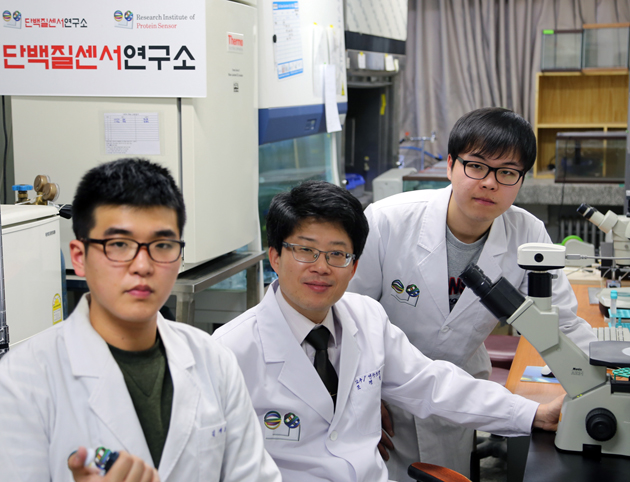Germicide in Humidifiers Promote Heart Aorta Fibrosis N
No.88553- Writer YU
- Date : 2013.01.28 18:52
- Views : 10422
YU Research Institute of Protein Sensor Provides Scientific Clue to Reveal Cause of Damage by Germicide in Humidifiers
Promotes skin aging and embryo inflammation, published on SCI international academic journal <Cardiovascular Toxicology>
[January 7, 2013]
Promotes skin aging and embryo inflammation, published on SCI international academic journal <Cardiovascular Toxicology>
[January 7, 2013]

The Research Team at YU Research Institute of Protein Sensor that scientifically proved the dangers of germicide in humidifiers (from left to right: Kim, Yong-jae, Professor Cho, Kyung-hyun, Kim, Hak-hyeon)
Since the germicide in humidifiers was found to be the culprit of deaths of dozens of patients with severe lung diseases in the spring of 2011, there were over 300 reports of suspected causes nationwide. Research results that scientifically proved its correlation was revealed by a Korean university research team.
The YU Research Institute of Protein Sensor's research team (director - Professor Cho, Kyung-hyun) purchased PHMG and PGH, which are the raw materials used for germicide in humidifiers and sold in the market, and used them as directed, injecting them in human blood serum protein, skin cells, blood vessel cells, and the embryos and adult forms of zebrafish to observe its physiological effects.
In result, the research team discovered that PHMG and PGH had severe toxicity such as ▲acute toxicity for cardiovascular system ▲promoting aging of skin cells ▲embryo inflammation, etc.
According to the research team, after observing zebrafish in water with PHMG products treated according to the recommendations (concentration placed in the water tank of humidifiers), all of the zebrafish in the PHMG (max density 0.3%) group died in 75 minutes, and in the PGH (max 10mM) group, all of the zebrafish died in 65 minutes.
In particular, after analyzing the heart of the dead zebrafish, it was found that collagen fibrosis progressed quickly in the aorta. This suggests that the cause of the deaths of patients with severe lung diseases and exposed to germicide in humidifiers was closely related to the increase of acute inflammation and aorta fibrosis. Moreover, in the blood serum of the dead zebrafish the inflammatory factors doubled compared to the control group, and in its liver tissue the severe fatty liver and acute liver inflammation were also found.
It was also found that the germicide in humidifiers severely damaged human skin cells as well. The research team placed the PHMG product's recommended usage on human skin cells. However, the skin death was too severe that further tests could not be progressed, and when diluting by more than ten times the recommended usage, about half of the cells died. It also promoted skin cell aging, while showing severe levels of transformation of blood vessel macrophage and cause of atherosclerosis. Macrophage is a cell that is in charge of the congenital immunity, and in the event there is transformation, it represents a higher risk of catching various diseases.
Meanwhile, in the embryos of zebrafish that were injected with small amounts of PHMG and PGH, it was found that development speeds slowed down, inflammation increased, resulting in more deaths of embryos. In particular, the research team found that the development speed of embryos slowed down the most and inflammation was most severe when injected with PGH.
This research, which was conducted with the support of the 'Junior Researcher Support Project' (core research) of the Ministry of Education, Science and Technology(MEST) and the National Research Foundation of Korea, and the 'Undergraduate Student Research Program Support Project' of the Korea Foundation for the Advancement of Science and Creativity(KOFAC), was published on the online version of the SCI international academic journal <Cardiovascular Toxicology> (title: “Acute cardiovascular toxicity of sterilizers, PHMG and PGH: severe inflammation in human cells and heart failure in zebrafish”).
In this paper, Kim, Hak-hyeon (23) a junior in the School of Biotechnology and Kim, Jae-yong (26) who is in the Master & PhD course in the Graduate School of Biotechnology participated as joint primary authors. In result, the number of SCI papers with primary authors being undergraduate students is now 6 from Professor Cho, Kyung-hyun's research lab since November 2008.
Professor Cho, Kyung-hyun (44, School of Biotechnology), who oversaw this research, stated, "After the report that dozens of patients with severe lung diseases died due to suspected relations to the use of germicide in humidifiers, the humidifiers with germicide were recalled and sales stopped, but the same substance is still being used in products such as moist tissue and disinfectant sprays," adding, "This research is the first in the world to scientifically reveal one of the causes and toxicities of germicide contents can cause death, and thus, we hope that it will present a safety guideline for substances used in household goods."